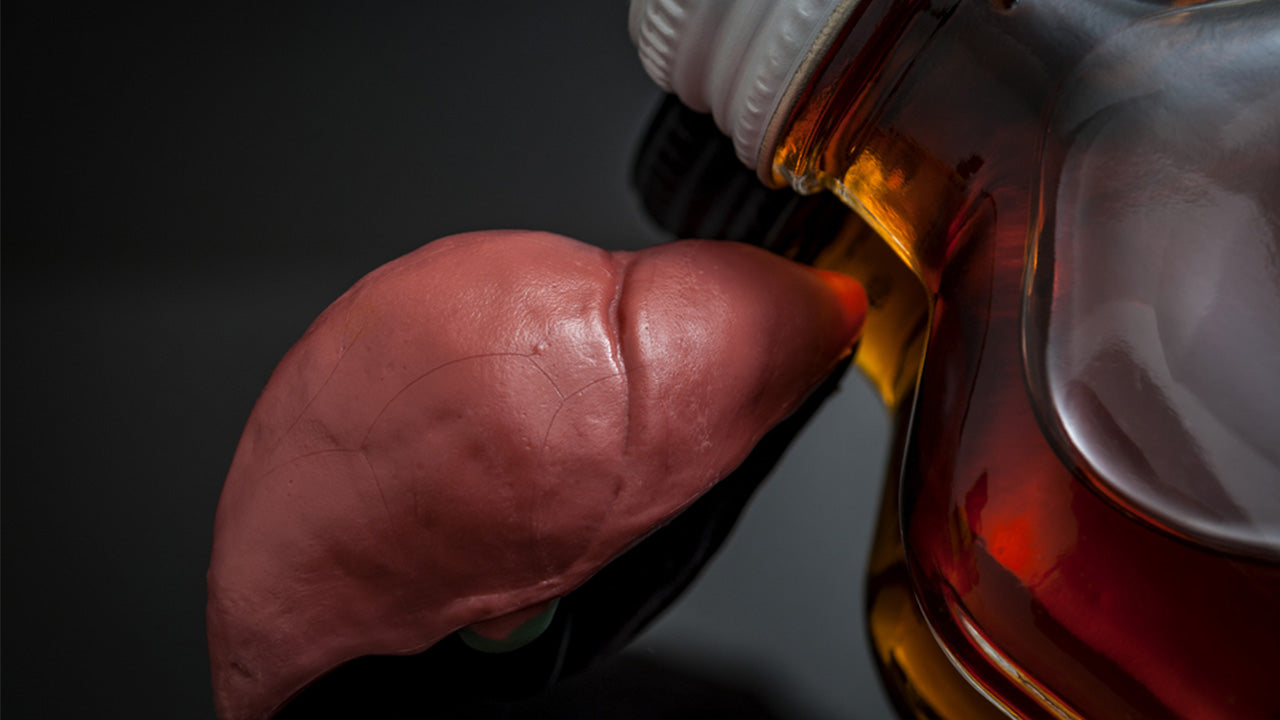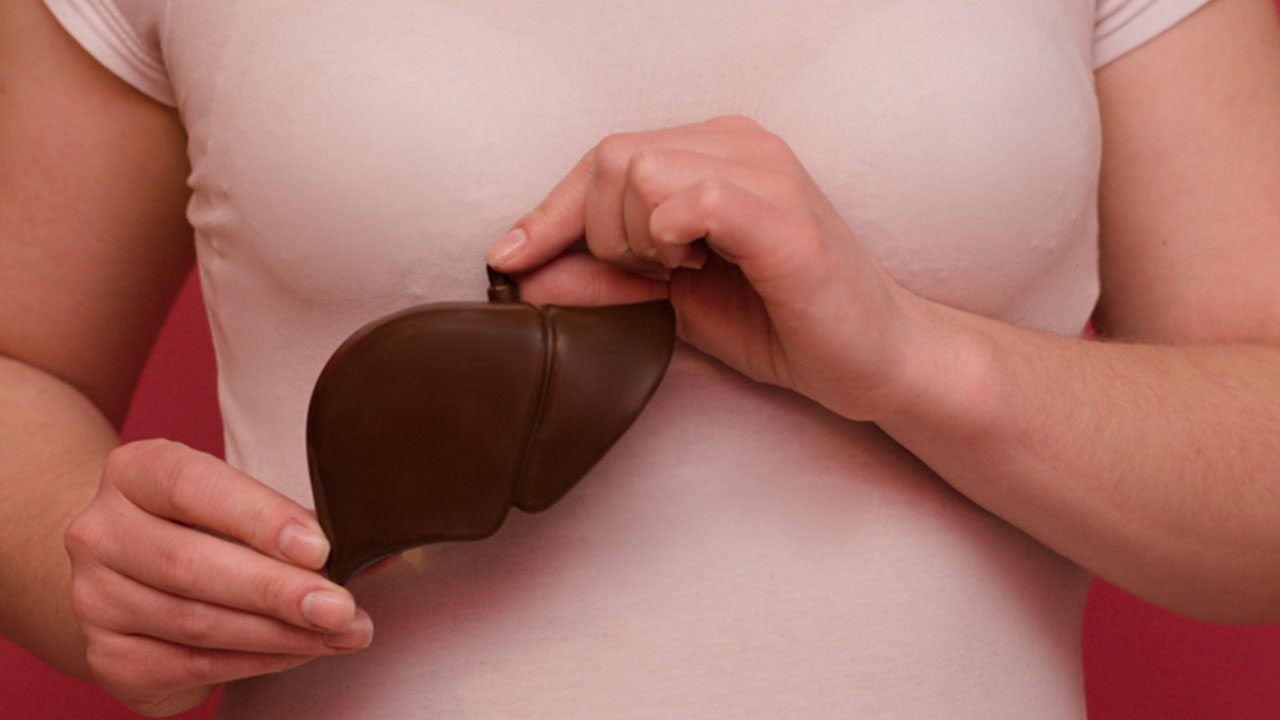Does Your Liver Heal Itself? Preventing the Signs and Treating the Symptoms of Liver Damage
 By: by Amino Science
By: by Amino Science

When it comes to the body's many organs, it's difficult to find one more impressive than the liver. With responsibilities that run the gamut from nutrient processing to detoxification, the liver must deal day in and day out with the stuff of life and the stuff of death. But as tough as the liver is, it can develop problems if overtaxed for too long. Which may lead you to wonder: does your liver heal itself? In this article, we're going to answer this important question and discuss what you can do to keep your liver healthy for life.
So Does Your Liver Heal Itself?
The short answer is yes.
In fact, the liver is the only organ in the human body that has the ability to completely regrow itself. Unbelievably, it can regenerate its entire mass—though not its shape—even if only 25% of healthy liver tissue remains.
And we're talking brand new, fully functioning liver cells, not the scar tissue that forms when you damage your skin—or your heart.
But how does it do this?
While the mechanisms underlying this feat are still being explored, scientists have found that the liver is filled with stem cells that contain an important enzyme called telomerase.
If that term sounds familiar, it's because the body uses telomerase to restore length to telomeres—the nucleotides that have garnered a lot of recent attention due to their ability to stave off aging by protecting the ends of chromosomes from deterioration.
And because stem cells are found throughout the liver, they give this amazing organ the ability to quickly repair itself no matter where the damage has occurred.
However, even with these telomerase-containing stem cells, liver repair can't occur without sufficient blood flow—which may explain why the liver is also the only organ to receive blood from two major blood vessels, the portal vein and the hepatic artery.
What Causes Liver Damage?
Even though the liver is admittedly one tough organ, genetic predisposition, infection, or constant, heavy bombardment with certain toxins can overwhelm its capacity to repair itself. And when this happens, a whole host of liver problems can result. However, some issues are more likely to result in liver damage than others.
Alcohol Abuse
While drinking alcohol in moderation is not harmful—and may even be beneficial—both heavy drinking and binge drinking can lead to alcoholic liver disease, the early stages of which manifest as fatty liver. However, if excessive alcohol use continues, the damage done to the liver can progress to episodes of alcoholic hepatitis or even cirrhosis of the liver and end-stage liver disease.
Autoimmune Conditions
If the immune system goes awry and begins attacking the liver, the constant assault can lead to chronic levels of inflammation and liver damage. The three main types of autoimmune liver diseases are:
-
Autoimmune hepatitis: This type of hepatitis occurs when the body's immune system begins attacking liver cells. If not controlled, the constant inflammation can eventually lead to cirrhosis and liver failure.
- Primary biliary cholangitis: Previously known as primary biliary cirrhosis, primary biliary cholangitis causes damage of the bile ducts. Over time, this may lead to a backing up of bile, which can cause cirrhosis.
- Primary sclerosing cholangitis: Similar to primary biliary cholangitis, primary sclerosing cholangitis also targets the bile ducts. However, unlike primary biliary cholangitis, primary sclerosing cholangitis causes chronic levels of inflammation, which may lead to excessive scar tissue and hardened bile ducts. This can result in serious liver damage and require a liver transplant.
Cancer
In the same way it damages other organs, cancer involving the liver or bile ducts can lead to liver damage and, sometimes, liver failure. Interestingly, cancer can also be an effect of liver damage, as certain liver problems, including cirrhosis and hepatitis, increase an individual's risk of liver cancer.
Genetics
Certain genetic abnormalities lead to the buildup of potentially toxic substances in the liver, which can cause varying degrees of liver damage. Some of the most common genetic conditions that may lead to liver problems include:
- Alpha-1 antitrypsin deficiency
- Wilson's disease
- Hemochromatosis
Nonalcoholic Fatty Liver Disease
As mentioned, the liver is responsible for nutrient processing. During the course of its duties, it naturally stores up small amounts of triglycerides. However, certain conditions not related to alcohol consumption—including elevated blood pressure and cholesterol, hepatitis C, obesity, and type 2 diabetes—can cause excessive levels of triglycerides to build up as the liver loses its ability to adequately metabolize fat.
While nonalcoholic fatty liver disease can present with little to no liver inflammation, it can sometimes progress to include damage to liver cells. If not treated, this condition, which is called nonalcoholic steatohepatitis, or NASH, can in turn lead to scarring and liver cancer and even liver failure.
Viral Hepatitis
The viruses that cause hepatitis A, B, C, D, and E are all known to result in liver damage. However, while hepatitis A and E typically cause acute infections that leave no lasting effects, hepatitis B, C, and D are known risk factors for both liver cancer and liver failure.

Risk Factors for Liver Disease
We've already touched on several conditions that may increase your risk of liver disease, including heavy alcohol use, obesity, and diabetes, but these aren't the only instigators that can put the health of your liver at risk. Other risk factors include:
- Having tattoos or piercings
- Needle sharing
- Being exposed to certain types of chemicals
- Receiving a blood transfusion prior to 1992
- Being exposed to the bodily fluids of others
- Engaging in unprotected sex
Common Symptoms of Liver Damage
Because of the liver's remarkable ability to heal itself, many people with early stages of liver disease don't know anything is wrong. In fact, unless you're suffering from an acute illness, like hepatitis A, you may not experience any symptoms at all—that is, until serious damage has already occurred. As damage progresses, the following symptoms may become more noticeable:
| Yellowing of the skin and eyes (jaundice) | Abdominal pain |
| Ascites | Weight loss |
| Leg and ankle swelling | Itching of the skin (pruritus) |
| Dark-colored urine | Bloody, pale, or tar-colored stool |
| Chronic fatigue | Nausea or vomiting |
| Loss of appetite | Easy bruising |
Diagnosing Liver Damage
If you're experiencing symptoms that lead your health care provider to suspect liver involvement, you may be asked to undergo one or more of the following tests.
- Blood tests: Liver-specific blood tests called liver function tests, or LFTs, are usually the first step in evaluating liver function. These tests measure levels of substances normally found in the liver to assess how well the liver is functioning.
- Imaging studies: Ultrasounds, magnetic resonance imaging scans, or MRIs, and computed tomography scans, or CTs, may be used to take images of the liver to look for any abnormalities.
- Tissue analysis: If blood tests or imaging pick up any signs of potential liver problems, a liver biopsy may be performed. This procedure involves inserting a long needle through the skin to extract a small piece of tissue from the liver. The biopsy sample is then sent for further laboratory analysis.
7 Simple Ways to Support Healthy Liver Function
The treatment for liver damage differs based on the type of disease involved and the extent of damage. While infections or cancer may require medication or surgery, liver problems caused by poor diet or the effects of alcohol can be treated—and prevented—by implementing a few simple lifestyle changes.
1. Avoid Contact with Bodily Fluids
Viruses like hepatitis C are spread via bodily fluids, so it's important to try to protect yourself from coming in contact with these potential sources of contamination. The best way to do this is to avoid sharing needles or personal care items and always being sure to use dental dams or condoms during sex.
2. Eat a Healthy Diet
Diets that include a lot of fried and processed foods, white flour, sugar, red meat, dairy products, and salt are associated with a higher risk of nonalcoholic fatty liver disease. However, diets that emphasize whole foods, like fruits, vegetables, nuts, seeds, whole grains, and fish, along with healthy oils like avocado and olive oil, provide the liver with what it needs to stay healthy and strong.
3. Take Amino Acids
Amino acids are known as the building blocks of life because they're essential for the construction of proteins, which in turn are involved in almost every process that goes on in the body, from muscle building to neurotransmitter production.
So when liver function isn't what it could be, it makes sense that supplementing with amino acids may help give it the support it needs. And it turns out that several amino acids and amino acid derivatives are especially suited to this task.
- N-acetylcysteine (NAC): The supplement form of the sulfur-containing amino acid cysteine, NAC acts as a potent antioxidant and has been shown in studies to support normal liver enzyme levels.
- S-adenosylmethionine (SAMe): This amino acid derivative, which is composed of a molecule of adenosine triphosphate (ATP) attached to the amino acid methionine, has been found in studies to protect liver cells and help prevent the progression of fatty liver disease.
- Taurine: Another sulfur-containing amino acid with powerful antioxidant properties, taurine is known to protect the liver against both oxidative stress and the buildup of excess liver fat.
-
Branched-chain amino acids (BCAAs): The BCAAs, which are made up of the amino acids leucine, isoleucine, and valine, have been found in studies to protect liver cells, reduce the buildup of scar tissue, and retard the progression of liver disease.
4. Get Regular Exercise
We all know that moving is important for overall health and well-being. But exercise is really important for liver health too. In fact, exercising on a regular basis not only helps lower triglycerides, but it also raises levels of the so-called good cholesterol—high-density lipoprotein, or HDL. And this can help lower the amount of fat stored in the liver.
5. Drink Less Alcohol
As we've seen, a healthy liver is perfectly capable of handling a moderate amount of alcohol. But heavy drinkers and individuals who engage in regular bouts of binge drinking run the real risk of developing alcohol-related liver disease.
But how much alcohol is too much?
According to the National Institutes of Health (NIH), men who drink 4 drinks a day or 14 drinks per week and women who drink 3 drinks a day or 7 drinks per week are considered at risk of developing problems related to their alcohol consumption.
So if this describes you, it's important to seek help and do whatever you have to do to bring your drinking under control.
6. Limit Exposure to Toxins
The liver's role in processing everything that enters your body has earned it the well-deserved title of the body's central processing plant. This means that everything you eat, drink, and breathe in (and often touch) is going to pass through your liver. And this includes toxic chemicals, excessive exposure to which can harm liver cells.
Unbelievably, due to a variety of reasons—not the least of which is regulatory loopholes—there are currently so many chemicals on the market that even the Environmental Protection Agency (EPA) is unsure exactly how many are out there. But the number is estimated to be in the tens of thousands.
That's a lot of potential toxins, and there's admittedly no way to avoid them all.
But while it's impossible to steer clear of every chemical currently circulating through our food, air, and water, it is within our power to limit direct contact with many of them. So wear appropriate protective equipment when dealing with any potential known toxins, including those found in:
- Paints
- Cleaning supplies
- Automotive products
- Aerosols
- Pesticides
- Herbicides
7. Know Your Medications
The widely used medication Tylenol (acetaminophen) has become well known for its propensity to cause liver damage when mixed with alcohol or taken in high doses.
However, Tylenol isn't the only medication that's relatively harmless in isolation but potentially toxic when used in combination with alcohol or other medications.
So, to avoid these potentially deadly combinations, be sure to educate yourself about any medications you're currently taking and speak with your health care provider before mixing medications with either alcohol or other medications or herbal supplements.
How Long Does It Take for the Liver to Heal Itself?
Did we mention the liver is one tough organ? When you consider how much gets thrown at it on a daily basis, we should all take a moment to be grateful for its strength and resilience.
Still, you may be wondering exactly how long it takes for a compromised liver to return to normal.
Believe it or not, the liver is so tough that even in cases of extreme damage, such as what can be seen with a life-threatening Tylenol overdose, the liver can fully regenerate to its original mass in as little as 30 days!
So if you're experiencing issues you think may be related to poor liver function, don't despair. But do speak with a qualified health care professional about your options. While some liver problems require immediate intervention, in most cases, changing your habits should be enough to get this important organ back on the road to health and wellness.

Up to 25% off Amino
Shop NowTAGS: liver
Join the Community
Comments (0)
Most Craveable Recipes




 833-264-6620
833-264-6620



















